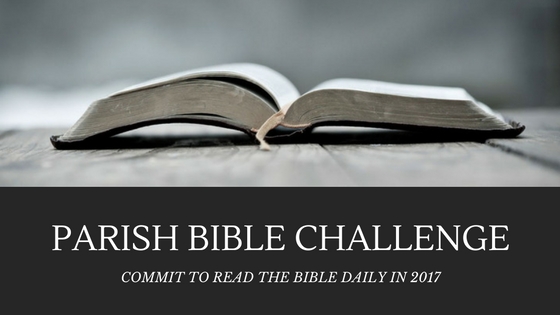
Parish Bible Challenge | Our Daily Bread

For me, a daily devotional has been critical to me for getting into the Word. For many years the little printed devotional, Our Daily Bread, was available in January for a small donation at the greeter area. Now, access is free online at odb.org and, much to my delight, the online version of Our Daily Bread is read out loud! One person reads the devotional and one reads the Scripture of the day. And if you want more, or want to read the Bible in one year, there are additional Scriptures to follow via hyperlinks.
A good time to meet with God for me is in the morning before the day becomes busy. When I am home, it is part of my routine when I have my coffee and do some stretching. I get up before daybreak when all is quiet. When I am on the road, it becomes more difficult to stay in my routine, but having someone read you the Word right on your phone, tablet, or computer seems easy enough! This plan for Scripture reading is great for new believers and seasoned believers alike, young and old.
Emily Wilson-McCrea
To read the vision behind the challenge, check out our previous post: http://bit.ly/2iput8Z
Parish Bible Challenge | Ethan’s Group

During our vestry retreat this fall, we came to a prayerful conclusion that the best thing our church can be doing on a daily basis is reading God’s Word. The first installment to this end was the Advent devotionals you all have been reading and writing. These have been so enjoyable for me as a glimpse into your faith, which is more precious than gold, and also a chance to reflect on Scripture daily. With Advent past and the coming of the New Year and Epiphany, there is no better time to jump into another challenge as a congregation.
People approach daily personal Bible reading in many ways. We’ve realized that this is true even within the vestry. Some folks use variations on the one year Bible, the daily office, specific devotionals written by favorite authors, or reading through books of the Bible over the course of days or weeks (not necessarily in the order they appear in the canon). I fall in the latter category.
So here is how it will work. If you want to join me this year, we will start with the Gospel of John, and will also include a daily Psalm. It will be 10-20 minutes of reading, which can be followed by 10-20 minutes of quiet reflection, praying, journaling, etc. I will send out a weekly email detailing what you should read within the week, maybe some historical context, maybe some outside resources, and we can use that email as a jumping board for discussion, reflection, or encouragement throughout the week.
Many people have already established a routine of daily personal time in the Scriptures, but many of you are probably like me, and can’t seem to find that 15-30 minutes every day despite finding it for other things. The reason for that, based on the survey we gathered from you all, has most to do with a lack of a plan. So here is one plan that’s available to you guys this year. If you’d like to join me you can email me at ServantReadingGroup1@gmail.com. I will also post on a private Facebook group called Servants of Christ Anglican Reading Group #1. If you would like to be added to this group please let me know in your email. I want to add a final note, that we will not likely make it through the entire Bible in one year, but my hope in going through less text is that we will have room to “read, mark, learn, and inwardly digest” that which we read every day.
In Christ,
Ethan Stonerook
Bonus Devotional | Psalm 145:18-20
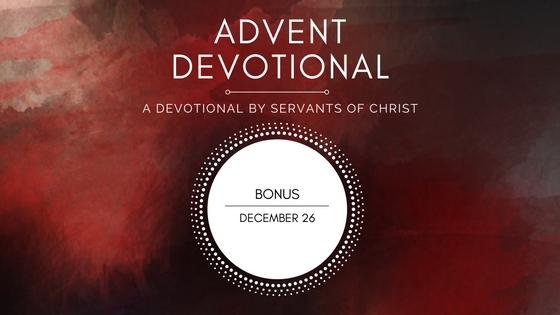
“The LORD is close to all who call on him, yes, to all who call on him in truth. He grants the desires of those who fear him; he hears their cries for help and rescues them. The LORD protects all those who love him, but he destroys the wicked.” Psalm 145:18-20 (NLT) (Context: Psalm 145)
God is always with you. I’ve heard this so many times, yet I still have moments when I feel He has abandoned me. One time that I thought God had left me was when my parents got divorced.
It was November of 2009 when they officially became divorced. They had already been separated for months before, but now my parents were no longer married, and there was an agreement in place for custody and child support and everything. At that time, I was only seven years old, and I didn’t quite understand Christianity. I figured, though, that I might as well say a prayer for the situation.
My many prayers for improvement were answered gradually. The first good thing about them separating was that I never had to hear them fight again which happened frequently when they were married. My mother, Kate Becker, introduced me and my siblings to the community of Servants of Christ shortly after she got divorced. The Lord provided so much support to us through the church in our first year there. Eventually, both of my parents got better jobs and became more financially secure.
I am not troubled nearly as much as the time that my parents got divorced currently, but when problems do occur, I often find myself seeking the Lord’s help. I am thankful the Lord rescued me from the pain of the divorce, and I truly believe that He is close to me when I seek Him.
Jeremy Griffin
Jeremy has been a member of Servants since 2010 and he was confirmed in 2015. He currently serves as an acolyte.
Twenty-Seventh Day of Advent | Romans 1:19-20
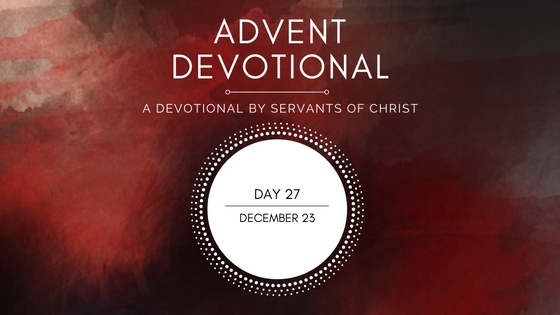
“For what can be known about God is plain to them, because God has shown it to them. For his invisible attributes, namely, his eternal power and divine nature, have been clearly perceived, ever since the creation of the world, in the things that have been made. So they are without excuse.” Romans 1:19-20 (Context: Romans 1:16-32)
“They shall pour forth the fame of your abundant goodness and shall sing aloud of your righteousness. The LORD is gracious and merciful, slow to anger and abounding in steadfast love. The LORD is good to all, and his mercy is over all that he has made.” Psalm 145:7-9 (Context: Psalm 145)
“Beloved, let us love one another, for love is from God, and whoever loves has been born of God and knows God. Anyone who does not love does not know God, because God is love. In this the love of God was made manifest among us, that God sent his only Son into the world, so that we might live through him. In this is love, not that we have loved God but that he loved us and sent his Son to be the propitiation for our sins. Beloved, if God so loved us, we also ought to love one another.” 1 John 4:7-11 (Context: 1 John 4:7-21)
God exists, He is good, and He loves you deeply. This, which the Scriptures above profess respectively, is the central truth of our lives.
Although it is an awesome proposition, I confess to you that I do have periods in my life where I thoroughly doubt this truth. My doubt, almost always, will result from some form of emotion-driven wrestling with what St. Thomas Aquinas in his work Summa Theologica addresses as the single most potent argument against the existence of God: the problem of evil. The argument goes: 1) If God were good, He would remove evil and suffering from His creatures; If He were omnipotent (all-powerful), He would be able to do what He wished; 2) But the creatures experience prevalent evil and suffering; 3) Therefore, God lacks either goodness, or power, or both. Although I have so far lived an unfairly fortunate life with little suffering of my own, I observe and am affected by the rampant suffering that exists all around us. Loneliness, depression, anxiety, addiction, financial distress, unemployment, poverty, violence, terrorism, war, racism, persecution, abuse, betrayal, injustice, pain, sickness and disease, tragedy, broken relationships, the loss of a dear loved one…the list goes on and on and is too much to bear. Where are You God?! How could You possibly be real when in the midst of all this awfulness You are seemingly absent or powerless?! I’m tired of waiting on You or trying to understand You and I just want it to stop. Unlike what St. Thomas Aquinas addresses as the second strongest (but much weaker) argument against the existence of God (i.e., that natural science can sufficiently and more reliably explain our reality), the problem of evil is powerful because it taps into our human emotions and can shake you to your core.
I eventually, but sometimes not easily, am able to recognize that, almost always, my doubt is nothing more than a wavering emotional response. Taking a lesson from CS Lewis, I strive to weather that storm by grounding my faith in reason: knowledge that is justified with the evidence of reason (of which the method of natural science is a subset), Divine revelation (which cannot contradict reason), and authority. (Paraphrasing CS Lewis from Mere Christianity: “that is why reason is such a necessary virtue; unless you teach your emotions where they go wrong you can never be a sound human, but just a creature dithering to and fro, with its beliefs really dependent on the weather and the state of its digestion.”)
Brilliant people have written books on a reasoned response to the problem of evil, but my novice summation is that it centers on four points. First, evil is not a thing that God created, condones, or is to blame for. It’s a wrong choice – the choice of those that God created (the ability of which is a necessary component in any true love story) of sin and selfishness that results in physical and spiritual suffering as a consequence as natural and unavoidable as broken bones from a jump off a cliff. Second, the true intellectual wonder is not that we experience suffering, but that we have experienced any goodness at all. Third, suffering can work for the greater good of wisdom. It is not true that all things are good, but it is true that “all things work together for good to those who love God.” (Romans 8:28) And finally, we are not able to fully understand the mystery of God, or how the problem of evil and the existence of suffering fits into our reality, but we can know, in a sense that is justified by reason, Divine revelation and authority, God’s solution to the problem of evil: His son Jesus Christ. God’s love sent His son to suffer amongst us and to die for us to defeat the power and consequences of evil. The cross is God’s love-driven part of the solution to evil. Our part is to repent, to believe, and to hope in the anticipation of an eternity fully in the presence of His love, together with all the saints, without suffering. That anticipation of our God is the heart of the Advent season.
So throughout this beautiful but troublesome life, and whatever suffering you have already or will experience, be grounded in and encouraged by the truth that God exists, He is good, and He loves you deeply. Our reality is an amazing love story, and you are a main character. And if and when in any emotion-driven moment that truth seems beyond belief, or even unsatisfying, know that you are not alone in this incredible journey.
Sean McDermott
In his own words: “Sean is 5’9’’ tall and 160 Ibs, and is currently watching the series ‘This is Us’ a few nights a week with his wife Caline in bed on her iPhone.”
Twenty-Sixth Day of Advent | Matthew 22:37-40
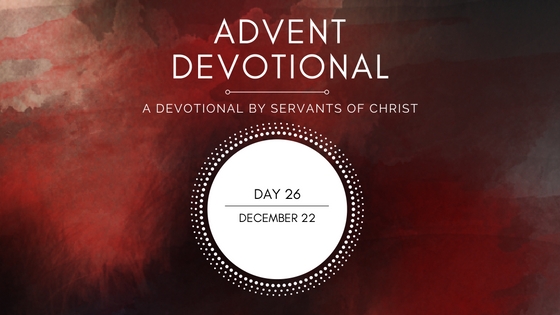
“Jesus replied: ‘“Love the Lord your God with all your heart and with all your soul and with all your mind.” This is the first and greatest commandment. And the second is like it: ‘“Love your neighbor as yourself.” All the Law and the Prophets hang on these two commandments.’” Matthew 22:37-40 (NIV) (Context: Matthew 22:34-40)
This passage could be considered one of the fundamentals of the faith, but the more I try to wrap my head around it, the more convicting it becomes. I might be able to convince myself that I could (momentarily) love the Lord with all my heart, though I have less of a context for how to love Him with all my soul. A person’s spouse may be referred to as a “soul” partner, but if my love for my spouse is supposed to be the next best reflection of what godly soul-love looks like, then I am a pathetic indeed.
The most troubling is the requirement of loving with all my mind. I know exactly how, where, and when I distribute my attention and am all too aware of how I do not pour out my mind to the Lord.
The greatest commandment succinctly proclaims the terrifying depth of my sin nature and the second commandment does nothing to bolster my self-confidence. Because sin involves disobedience to these commandments, I can make a strong argument that I am in a constant state of sin. Only when I begin to understand the depth and pervasiveness of this sin do I begin to find myself in awe of Jesus and the kind of sacrifice He made.
“He was despised and rejected by mankind, a man of suffering, and familiar with pain. Like one from whom people hide their faces he was despised, and we held him in low esteem. Surely he took up our pain and bore our suffering, yet we considered him punished by God, stricken by him, and afflicted. But he was pierced for our transgressions, he was crushed for our iniquities; the punishment that brought us peace was on him, and by his wounds we are healed.” Isaiah 53:3-5 (NIV)
ALLELUIA! ALLELUIA! ALLELUIA!
Justin Smith
In his own words: “Justin joined Servants with Nikki in 2011 and is currently serving as a lector. He also went down into a pit on a snowy day and killed a lion… oops, no, that was Benaiah (2 Samuel 23:20).”
Twenty-Fifth Day of Advent | 1 John 4:7-8
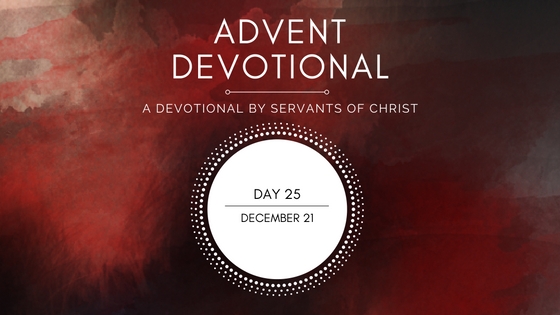
“Beloved, let us love one another, for love is from God, and whoever loves has been born of God and knows God […] because God is love.” 1 John 4:7-8 (Context: 1 John 4:7-21)
I have noticed that dog owners have an extra measure of love. I’ve never lived with a dog, until recently, when my daughter moved home with her Golden Retriever puppy. The puppy took up residence in my revered space, my kitchen, which is attached to the family room where my prayer chair rests. My morning routine of brewing tea, reading Scripture, praying and writing was immediately replaced with a puppy teething on my slippers and pulling on my pant legs to play, cries for attention as I sat down to pray, feeding, exercising, toileting, etc. I often left for work frustrated and complaining about what I saw as disruption to my coveted peaceful mornings.
On my 30 minute commute to work, I listen to Scripture. The word that was repeatedly catching my attention was “love.” 1 John chapters 3 and 4 repeat the word 34 times. I then remembered the words of Jesus when He shared the two greatest commandments in Mark 12:30-31, which are to love the Lord your God with all your heart, soul, mind and strength and to love your neighbor as yourself.
In that moment, God gave me a clearer understanding of a concept that I’ve heard thousands of times. We are here to love. That is our calling. That is our commission. Everything that we do and say must originate from love. (1 John 3: 18)
However, there are people and puppies that I find really hard to love. But, since God is love, and Jesus is God, and Jesus lives in me; then Jesus can love through me. I do not need to love in my own power; in fact, I find it impossible to love fully and satisfactorily on my own. Love involves mercy, forgiveness, and self-sacrifice, which are virtues that I do not automatically possess.
So, I asked Jesus to help me love my daughter’s puppy. And as God always does, He answered my prayer in amazing ways! As my resentment toward puppy faded, I found new ways to love her, such as taking her to the dog park where she could socialize with the other dogs and where I enjoyed getting to know their owners. I found the bonds between my daughter and I strengthening as I embraced this bundle of fur that she loves. Puppy has deepened my ability to love and reminded me that love is the reason that we are on this earth.
As I walk into my skilled nursing facility in the morning, I ask Jesus to love through me. The other day a coworker said, “Give me a hug, you have the sweetest spirit.” I was grateful that God had answered my prayer, and that the love of Jesus could be experienced through me.
Marianne Manasterski
Marianne joined Servants of Christ in 2013. She currently serves on the prayer team.
Twenty-Fourth Day of Advent | Isaiah 41:10
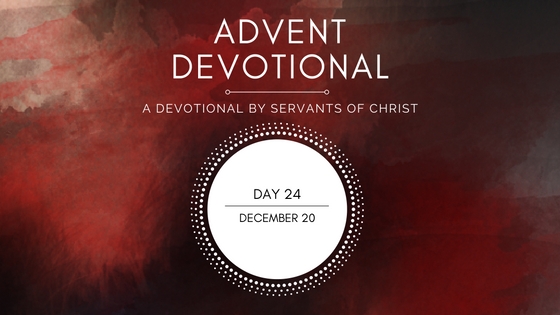
“Fear not, for I am with you; be not dismayed, for I am your God; I will strengthen you, yes, I will help you, I will uphold you with my righteous right hand” Isaiah 41:10 (NKJV)
In the beginning of chapter 41 of Isaiah, God reminds the people of Israel that it is He who has delivered them from bondage, not man. God reassures Israel that they need not fear, but look to Him. Throughout the Bible, God uses those who are weak or flawed for His will: Moses stuttered; Ehud was left-handed, an oddity in those days; David was an adulterer and murderer; and Rahab was a prostitute.
As an introvert, I’m very comfortable serving in behind-the-scenes roles. I’ve struggled with feelings of inadequacy throughout my life. A few years ago, I read The 10 Second Rule by Clare De Graaf which challenged me to step out in faith when I hear the prompting of the Holy Spirit. It’s reminded me to put my trust in the Lord and to act, knowing that on my own I am weak, but I am just the instrument God is using in the situation. Paul reminds the people of Corinth and us when he writes that the Lord said, “My grace is sufficient for you, for my power is perfected in weakness.”
God is in control; I need only be obedient and trust. It’s not only despite my flaws, but because of them that His power is magnified through His use of me.
Tracy La Cagnina
Tracy has been a part of Servants for many years, serving – as she says – in the background. She serves on Vestry, the Altar Guild, and the Mission Team; and it’s safe to say that not a single event happens at Servants without significant help from Tracy. From coffee hour to Alpha to “Beer and Hymns,” if it’s happening, she’s there with helping hands.
Twenty-Third Day of Advent | Mark 2:17
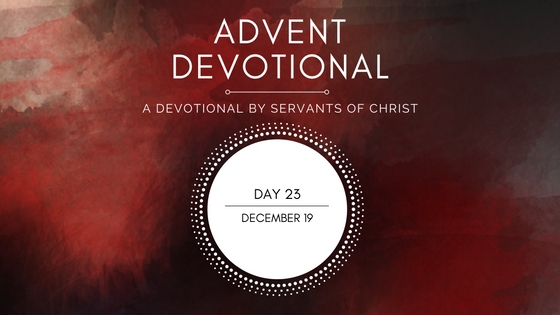
“On hearing this, Jesus said to them, ‘It is not the healthy who need a doctor, but the sick. I have not come to call the righteous, but sinners.’” Mark 2:17 (NIV) (Context: Mark 2:13-17)
This verse gives me hope daily. I lived outside the law early in life thinking only of myself, taking all I could. Then came a point when I found myself empty and desperate. Hope was gone. Nothing outside filled the hole anymore. I had stepped over the line and didn’t think there was any redemption for me. Little did I know God was calling me. He put me on my path back to Him. I came to Servants and began to read and hear His word. After hearing this verse and others like it I came to believe Christ died for me. That He loves me right where I am, so I surrendered my life to Christ as He did for me. Christ loved when I hated myself. He held me until I was ready to hold someone else. Today I am able to represent Christ to those who try to fill the hole the way I did and show them Christ’s love.
Mike Bey
Mike came to Servants of Christ in 2007. He currently serves on the vestry.
Twenty-Second Day of Advent | Matthew 1:1-16
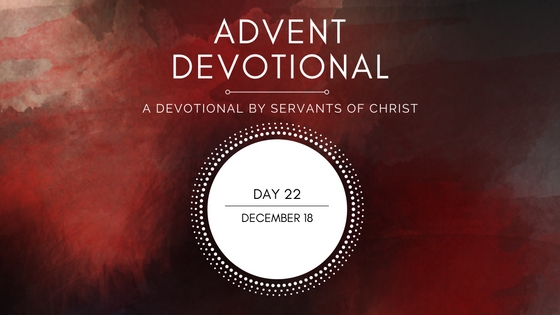
“The book of the genealogy of Jesus Christ, the son of David, the son of Abraham. Abraham was the father of Isaac, and Isaac the father of Jacob, and Jacob the father of Judah and his brothers, and Judah the father of Perez and Zerah by Tamar, and Perez the father of Hezron, and Hezron the father of Ram, and Ram the father of Amminadab, and Amminadab the father of Nahshon, and Nahshon the father of Salmon, and Salmon the father of Boaz by Rahab, and Boaz the father of Obed by Ruth, and Obed the father of Jesse, and Jesse the father of David the king. And David was the father of Solomon by the wife of Uriah, and Solomon the father of Rehoboam, and Rehoboam the father of Abijah, and Abijah the father of Asaph, and Asaph the father of Jehoshaphat, and Jehoshaphat the father of Joram, and Joram the father of Uzziah, and Uzziah the father of Jotham, and Jotham the father of Ahaz, and Ahaz the father of Hezekiah, and Hezekiah the father of Manasseh, and Manasseh the father of Amos, and Amos the father of Josiah, and Josiah the father of Jechoniah and his brothers, at the time of the deportation to Babylon. And after the deportation to Babylon: Jechoniah was the father of Shealtiel, and Shealtiel the father of Zerubbabel, and Zerubbabel the father of Abiud, and Abiud the father of Eliakim, and Eliakim the father of Azor, and Azor the father of Zadok, and Zadok the father of Achim, and Achim the father of Eliud, and Eliud the father of Eleazar, and Eleazar the father of Matthan, and Matthan the father of Jacob, and Jacob the father of Joseph the husband of Mary, of whom Jesus was born, who is called Christ.” Matthew 1:1-16
This is the Son of David, the Son of Abraham! In my opinion, I think we should add the genealogy in Matthew to the liturgy. Aside from the entertainment of hearing Father Alex attempt to read it, it screams good news! Aside from their connection to Christ Jesus, many in this list have no reason to be lifted up, and considering their offenses, they should be blotted out of God’s history altogether. He is the son of polygamists, idolaters, murderers, and prostitutes.
This list brings about some important things for us think about. First, this shows that God was acting and working in the midst of the terror and horror that was going on in the world throughout the dark days of history leading up to Jesus’ birth. Also, we see once more that God follows through and fulfills his promises.
When we look at the current landscape in our world, we see a lot of reasons to be anxious. Between the division due to a bitter election cycle, terrorism, and worries about the direction of the church and our country, many are left in fear and concern for the future. Nevertheless, we can rest assured that God is with us, and he is working to carry out his plan to bring about new reality.
Prayer
Holy Father, you are gracious and merciful, slow to anger, and abounding in steadfast love. We give you thanks for the gift of you Son, our Savior, Jesus Christ. Comfort your people from their fears and anxieties of this world. Grant us faith to persevere through trials and tribulations, and stir up in each of us a pure heart so that we might delight in doing your work. In Jesus name, Amen.
Jason Dampier
Jason, a Lutheran seminarian, came to Servants in 2014 to be mentored by Fr. Alex and to gain experience in ministry. Along the way, he has worked with our children, our youth, and our elderly parishioners, serving steadfastly. In August he married his wife Jessica, last week he finished his studies at Gordon-Conwell Theological Seminary, and at the beginning of January he and Jessica will move to Gastonia, NC where he will complete a year-long internship with a Lutheran church. He and Jessica will be missed sorely, but you can hear him preach one more time at Servants on New Year’s Day!
Twenty-First Day of Advent | Psalm 34:18
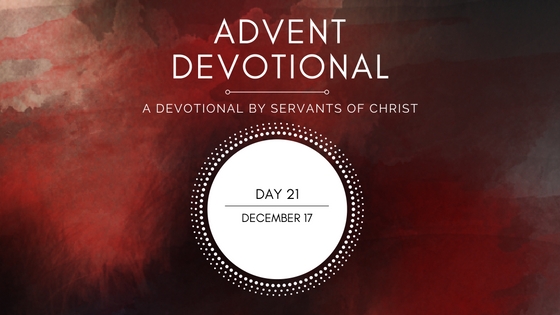
“The Lord is close to the brokenhearted; he rescues those whose spirits are crushed.” Psalm 34:18 (Context: Psalm 34)
“I have set the Lord always before me; because he is at my right hand, I shall not be shaken. Therefore my heart is glad, and my whole being rejoices; my flesh also dwells secure. For you will not abandon my soul to Sheol, or let your holy one see corruption. You make known to me the path of life; in your presence there is fullness of joy; at your right hand are pleasures forevermore.” Psalm 16:8-11 (Context: Psalm 16)
I am very much still brokenhearted over the loss that I have experienced this past year. My stepfather Ray recently passed away from a glioblastoma brain tumor. After losing my Dad in 2004 to leukemia, I couldn’t imagine my mom having to lose another husband, me losing another father, my children losing a grandfather. I didn’t want to be someone who cried out to God, “WHY?! He is too young, this is too much, I don’t want this…” But I was shaken, and I did.
God used Ray to speak to my heart. Despite his prognosis, Ray’s faith was unshaken. I was blown away by how he spent his final year here on Earth; traveling, engaging with everyone he encountered in intentional and deep conversations about his faith, and experiencing what he loved in this world surrounded by the people he loved. Every day Ray soaked-in God’s word, despite the aphasia making it difficult to read. He woke each morning with joy, despite the restless and painful nights. He used every ounce of his remaining strength to go boating, cook fabulous meals, spoil his grandchildren and watch sports!
Sean and I were asked to sing at Ray’s funeral and, besides being completely overwhelmed, I was deeply humbled. At some point during the last year, God gave me a song by Sandra McCracken called ‘Sweet Comfort.’ I was struck by the lyrics, which illustrated Ray’s perspective. To me the words were like the prayer of Ray’s heart. Here is a lyric from the song:
This bitter cup, I take it;My fainting heart restored.So here I stand, unshaken;I trust upon the Lord.
Although my body was literally shaking in nervousness right before singing in front of a very large crowd that came to celebrate the life of and mourn the loss of Ray, God gave me an indescribable wave of peace the moment we began to sing. I knew that God wanted the song to be shared and I was beyond honored to be used by God in that moment to “comfort those who mourn.”
Watching how Ray, and also my dear friends Ralph Coryell and Bev Handley, all lived when faced with their own mortality was both beautiful and inspiring. It has motivated me to reflect on my own faith. It has challenged me to be intentional in how I spend each day of my life. It has given me a renewed perspective, which is helping me to focus on and revel in what is important in my day-to-day life. “You make known to me the path of life; in your presence there is fullness of joy; at your right hand are pleasures forevermore.”
Although I am still heartbroken, I am thankful that Ray, Ralph, and Bev are with their Savior in heaven, free of pain. I am thankful that every Sunday during the Prayers of the People, I can picture Ralph, Bev, Ray, and my Dad, together with God, healed and whole.
Caline McDermott
Caline joined Servants in 2012. She serves on the worship team, often helps lead The Share, a weekly women’s Bible study, and is a part of her community group’s outreach to Grace Marketplace each month.
